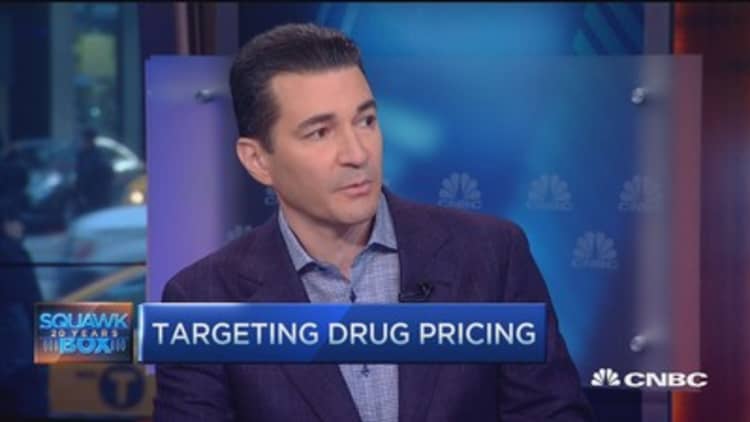
Americans concerned about not being able to afford life-saving treatments should not blame drug companies for high prices, a former health advisor to George W. Bush said Tuesday.
Dr. Scott Gottlieb of the conservative American Enterprise Institute told CNBC's "Squawk Box" there's not really a drug cost problem in the U.S., except for a small subset of specialty drugs that cost a lot but are providing a lot of benefit.
"What we have is an under-insurance problem," he said. "People are now under-insured, especially for catastrophic drugs if they get a disease like cancer or something like that because of these new [narrow] formulary designs … popularized by the Affordable Care Act."
Read More Obamacare architect: High-deductible plans overdone
Defined on the government health care website, the term formulary, also known as a drug list, is described as a rundown of treatments covered by a prescription plan or another insurance plan offering prescription drug benefits.
"If the drug is not on your [Obamacare] formulary list, you have no co-insurance. You're completely on your own," said Gottlieb, an advisor to the Centers for Medicare & Medicaid Services in the Bush presidency. The agency, a division of the Health and Human Services Department, administers government health-care programs, including Obamacare. "Since these plans are the predominant structures in Obamacare, they're starting to migrate into commercial plans" in the workplace, he said.
Besides Main Street, outrage over drug pricing has become a hot topic on Wall Street and the presidential campaign trail.
Valeant Pharmaceuticals has been in the crosshairs in recent months in part for its strategy of acquiring drugs and then raising their prices. Turing Pharmaceuticals also drew national attention in September, after acquiring the 62-year-old medicine Daraprim and raising its price by 5,000 percent.
Democratic presidential front-runner Hillary Clinton seized on the Turing example as a springboard for her platform on reducing drug prices.
Clinton, along with Republican presidential front-runner Donald Trump, on Monday blasted Pfizer's $150-plus billion offer to buy Allergan, calling the merger a tax dodge.
The deal, announced Monday, would see a crown jewel of the American pharmaceutical industry move its corporate headquarters to the lower corporate tax haven of Ireland, where the Botox maker is located.
"I don't expect much to happen with the respect to the inversion that was announced yesterday with Pfizer and Allergan. I think the [Obama] administration is just going to have to pout and probably want the political issues going to the election," said Gottlieb.
Pfizer anticipates to reduce its effective tax rate to about 17 percent to 18 percent from its current U.S. rate about 25 percent.
— Disclosure: Gottlieb said he advises investors in biopharma companies and consults with biopharma companies.


